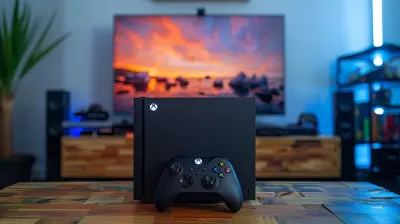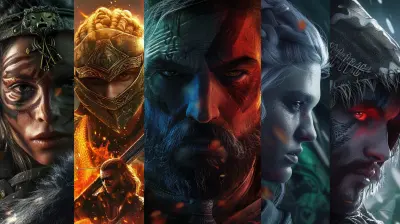How Game Deal Newsletters Can Save You Money
19 August 2025
Let’s face it — gaming can get pretty expensive. Between AAA game releases, indie gems, all the DLCs, season passes, in-game cosmetics, or trying to keep up with Steam’s exploding library, your wallet probably feels like it just got hit with a fireball. If you're tired of paying full price for every game or missing out on those killer deals, there’s a simple solution you might be overlooking — game deal newsletters.
Yep, those humble little newsletters sliding into your inbox can actually be your secret weapon for gaming on a budget. But how? And are they worth it in the sea of online spam? Buckle up, because we’re going to dive deep into how game deal newsletters can save you money — and why every gamer should be subscribed to at least one.
What Exactly Is a Game Deal Newsletter?
Let’s start from the top. A game deal newsletter is basically a curated email (usually daily or weekly) that gathers the best game deals available across various platforms like Steam, PlayStation Store, Xbox Marketplace, Epic Games Store, Humble Bundle, and more. It does the hunting for you.Instead of manually checking dozens of websites every day hoping for discounts, the newsletter becomes your digital sidekick, swooping in with hand-picked, time-limited offers straight to your inbox.
It’s like having a friend who watches all the price drops so you don’t have to.
How Game Deal Newsletters Help You Save Big
Okay, now let’s get to the juicy part. How exactly do these newsletters put money back in your pocket?1. 🤑 You Never Miss a Sale Again
Ever bought a game full price, only to see it 50% off a few days later? It stings. Game deal newsletters make sure that never happens again.They typically monitor real-time sales and notify you as soon as a hot deal drops. Plus, some services even let you set custom alerts for specific games or price points. So if you've been eyeing Elden Ring but refuse to pay full price, you can wait until it drops below, say, $30 — and boom, you’ll get an alert.
2. ⌛ Save Time (A Lot of It)
Think about how long it takes to browse each store individually. Steam has thousands of games. Then there’s Epic, GOG, Xbox, and PlayStation... It's like trying to find a needle in a haystack filled with other haystacks.Game deal newsletters eliminate the hassle. You get curated lists of the best offers — sometimes even categorized by tags like genres, platforms, or highest discount percentage. It's like having Netflix recommendations, but for games that don’t break the bank.
3. 💰 They Highlight Limited-Time Free Games
Let’s not forget the best four-letter word in gaming: FREE.Many newsletters include alerts for time-sensitive freebies. Epic Games, Amazon Prime Gaming, and even Steam occasionally give away full games for free — but only for a short window. Miss it, and it's gone.
Being subscribed to a newsletter means you’ll always be in the know when new freebies go live. That $0.00 price tag? Chef’s kiss.
4. 🎯 They Track Your Wishlist for You
Remember that wishlist you put together during a weekend binge session? Those 38 games you swore you’d buy during the next sale?Many newsletter tools are smart enough to sync with your wishlist — especially if you're using services like IsThereAnyDeal or CheapShark. When one of your wanted titles gets discounted, your inbox lights up like a party invitation.
And best of all — you won’t waste money on impulse buys. You’ll wait for your chosen titles to hit your personal price sweet spot.
5. 🔁 Stay Updated on Bundle Deals
Humble Bundle and Fanatical are famous for their bundles. They pack in a bunch of games for one low price — sometimes less than the cost of a single full-priced title.Most newsletters carefully track and update these offers. So instead of checking their sites every few days, you get bundle alerts delivered directly to you. It’s like a grocery store flyer — but instead of discounts on cereal, it’s discounts on your favorite roguelikes.
Popular Game Deal Newsletters Worth Subscribing To
Not all newsletters are created equal. Here are some of the top contenders, each with their own strengths:🗞️ IsThereAnyDeal
This one’s a game changer. It connects with your Steam wishlist and alerts you the moment those games go on sale — across multiple official stores.Major perks:
- Price tracking & history
- Regional pricing
- Custom alerts (e.g., "Tell me when it’s 75% off")
🗞️ Humble Bundle Newsletter
Always stuffed with quality bundles and perks. Plus, sales support charity, so you get games and good karma.🗞️ GG.deals
Offers a newsletter that’s jam-packed with the best current deals from verified sellers. You can even filter by DRM-free games if you’re into ownership.🗞️ CheapShark
A lightweight but super effective newsletter. Perfect if you're just looking for the best price at the moment for any given title.🗞️ Fanatical Updates
Fanatical frequently drops killer bundles, flash sales, and themed packs. Their newsletter ensures you never miss out.
Tips to Get the Most Out of Game Deal Newsletters
Now that you’re sold (pun intended), let’s talk strategy. Here’s how you squeeze the most value out of those game deal digests:✅ Set a Budget
Just because something is 80% off doesn’t mean it’s free. Use newsletters to identify value — not impulse buys.Set a monthly budget for game purchases. Only pull the trigger when you absolutely love a deal, not just because it’s discounted.
✅ Create a Wishlist of Must-Plays
Keep a running list of games you genuinely want to play. When they pop up in deals, you’ll know it’s worth buying.This also helps avoid that dreaded backlog of shame — you know, the games you bought on sale and still haven’t touched.
✅ Use a Secondary Email (Optional)
If you sign up for a bunch of newsletters, it's a good idea to create a separate email just for deals, giveaways, and gaming news. It'll keep your main inbox nice and tidy.✅ Act Fast with Flash Deals
Some flash sales only last a few hours. Check your game deal newsletter ASAP when it hits your inbox. If something catches your eye, don’t hesitate — good deals vanish fast.Are There Any Downsides?
Honestly, not many. But to be fair, here are a couple of things to keep in mind:- You might get tempted to buy more than you should. Discounts can be seductive.
- Not every newsletter is tailored. Some are just “here’s a long list of deals” and can feel like information overload.
- Some newsletters might promote third-party key sellers. Always make sure the sources are legit to avoid pirated or revoked keys.
The key? Be smart, stay disciplined, and treat these newsletters as tools — not shopping triggers.
Final Thoughts: Newsletters Are the Gamer’s Coupon Book
In the end, game deal newsletters are like cheat codes for your wallet. They’re hassle-free, cost you nothing, and can save you hundreds of dollars each year — especially if you’re a collector, casual gamer, or just someone who likes trying new titles without emptying your bank account.So, if you like deals (who doesn’t?) and love scoring a brand-new game for the price of a cup of coffee, then subscribing to a few of these newsletters is a total no-brainer.
Why pay full price when patience — and a well-timed email — can land you the same game at half the cost?
Go ahead. Subscribe. Game smarter, not harder.
all images in this post were generated using AI tools
Category:
Gaming DealsAuthor:

Leandro Banks
Discussion
rate this article
2 comments
Brittany Cross
Great tips for gamers!
February 1, 2026 at 3:39 AM
Valencia Morrow
Unlock hidden treasures in your inbox—game deals await the curious and savvy!
August 20, 2025 at 4:35 PM

Leandro Banks
Absolutely! Game deal newsletters are a goldmine for savvy gamers looking to save. Happy hunting!


